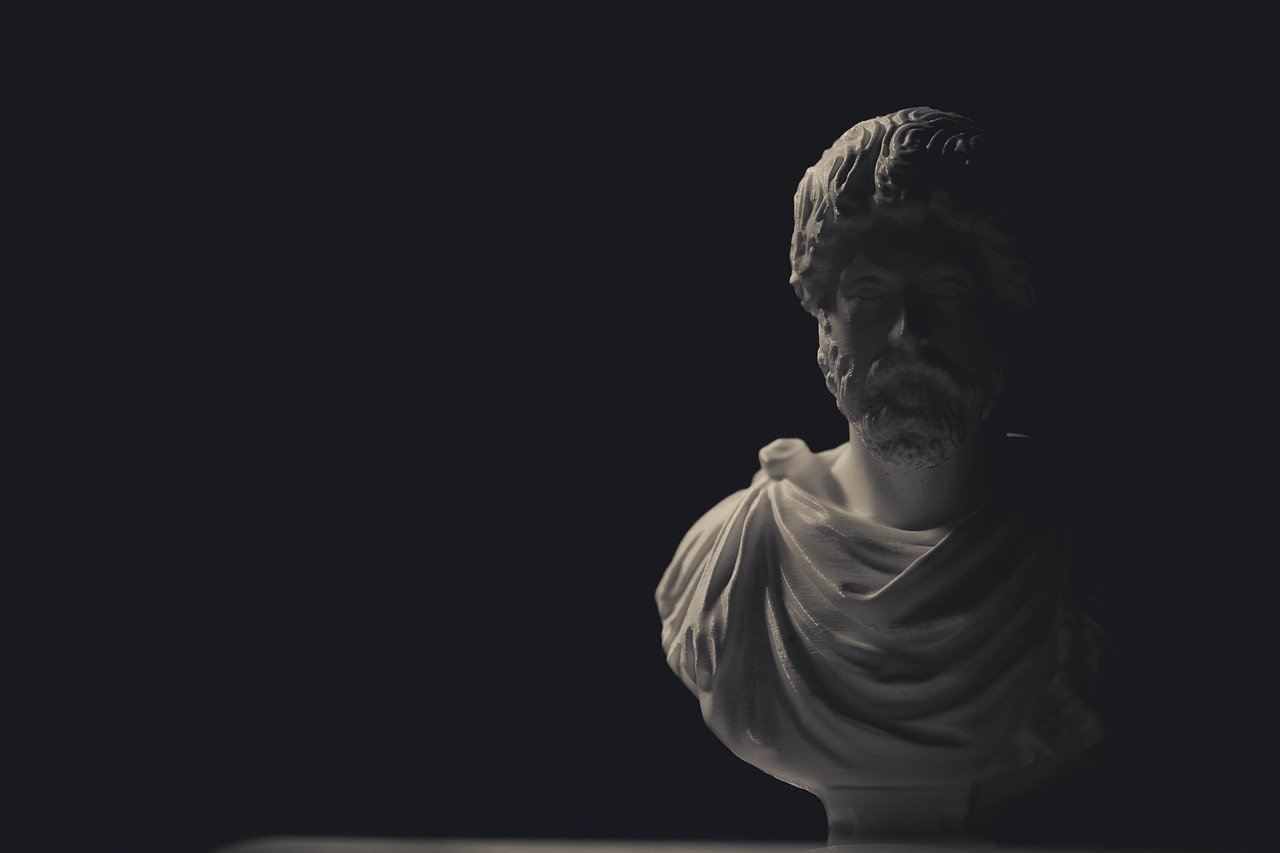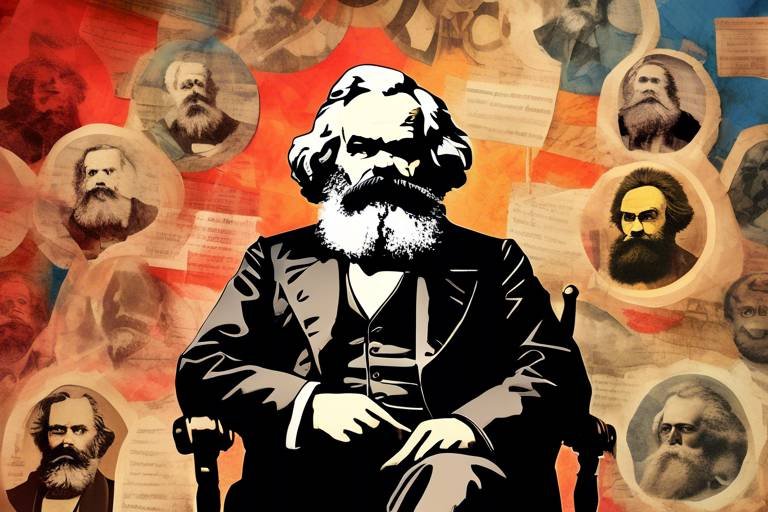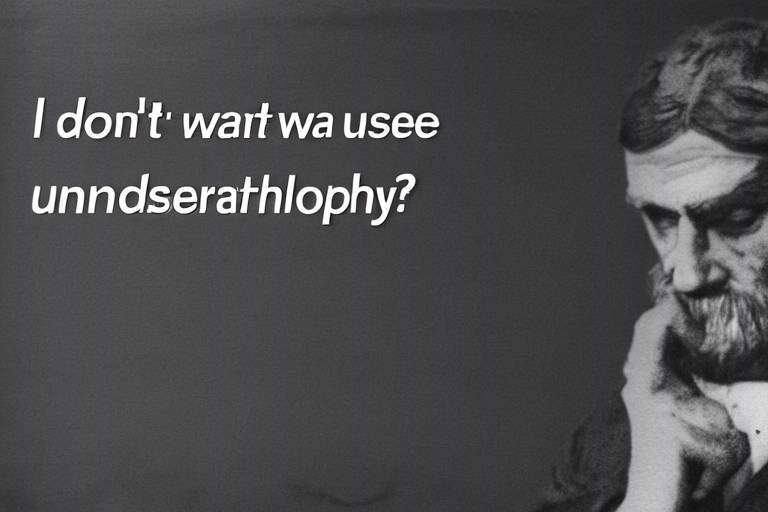Philosophical Thoughts on Reality - An Analysis
Reality is a concept that has intrigued thinkers for centuries, prompting profound questions and debates that span across cultures and eras. When we dive into the philosophical waters of reality, we discover a rich tapestry woven from threads of existence, perception, and truth. Each philosopher brings their own unique lens through which to view the world, leading to a myriad of interpretations. What does it really mean to exist? How do we know what we know? These are not merely academic queries; they are the very essence of our human experience.
At its core, the exploration of reality invites us to question our assumptions about the world around us. Is reality something that exists independently of our perceptions, or is it shaped by the way we experience it? Thinkers like Plato and Aristotle laid the groundwork for these discussions, with Plato famously asserting that the material world is merely a shadow of a higher, unchanging reality. In contrast, Aristotle emphasized the importance of the physical world, suggesting that our understanding of reality is grounded in our sensory experiences. This dichotomy sets the stage for a deeper inquiry into how we define and perceive reality.
As we traverse through different philosophical traditions, we encounter the concepts of realism and idealism. Realists argue that reality exists independently of our thoughts and beliefs, while idealists contend that reality is fundamentally shaped by our perceptions and consciousness. This raises an intriguing question: if our perceptions are inherently subjective, can we ever truly grasp the essence of reality? The implications of these perspectives are profound, influencing everything from science to ethics and our everyday decision-making.
In the journey to comprehend reality, we also face the challenge of perception. Our senses are our primary means of interacting with the world, yet they can be deceiving. Consider the classic philosophical thought experiment of a mirage in the desert. What appears as water is nothing more than a trick of light—a reminder that our perceptions can lead us astray. This raises the philosophical implications of sensory experience and the subjective nature of understanding. Are we merely passive observers of reality, or do we actively construct our understanding through our experiences?
To illustrate this further, let's take a look at a comparative table that highlights key differences between two dominant philosophical schools of thought: Empiricism and Rationalism.
| Aspect | Empiricism | Rationalism |
|---|---|---|
| Knowledge Acquisition | Knowledge comes from sensory experiences. | Knowledge is innate or derived from reason. |
| Key Thinkers | John Locke, David Hume | René Descartes, Immanuel Kant |
| View on Reality | Reality is shaped by our experiences. | Reality is understood through innate ideas. |
As we delve deeper into these philosophical waters, we encounter the constructivist perspective, which posits that our understanding of reality is not just a passive reflection but an active construction shaped by social contexts and individual experiences. This notion challenges the idea of a singular, objective reality and instead suggests that our realities are as diverse as the individuals who perceive them. In a world rich with varying perspectives, how do we navigate the complex landscape of truth and existence?
Ultimately, the philosophical exploration of reality is an ongoing dialogue—a dance between the known and the unknown, the subjective and the objective. As we engage with these ideas, we are reminded that our understanding of reality is not static; it evolves as we grow, learn, and experience life. So, what does reality mean to you? Are you ready to embark on this philosophical journey and explore the depths of existence? The answers may surprise you.
- What is the main question philosophers ask about reality? Philosophers primarily ask what constitutes reality and how we can know what is real.
- How do perception and reality interact? Our perceptions shape our understanding of reality, but they can also mislead us, making the relationship complex.
- What are some key philosophical perspectives on reality? Major perspectives include realism, idealism, empiricism, rationalism, and constructivism.
- Can reality be defined universally? No, reality is often seen as subjective, influenced by individual experiences and cultural contexts.

Defining Reality
When we dive into the concept of reality, we often find ourselves grappling with a question that seems deceptively simple: What is reality? This inquiry has been a cornerstone of philosophical thought, prompting a myriad of interpretations and definitions across various traditions. At its core, reality can be seen as the sum of all that exists, encompassing both the tangible world we can see and touch, as well as the intangible aspects of existence that elude direct observation. Philosophers have long debated whether reality is an objective entity that exists independently of our perceptions or if it is, in some way, shaped by our subjective experiences.
One prominent perspective is realism, which posits that reality exists outside of our perceptions. Realists argue that the world is composed of objects and facts that remain unchanged regardless of our beliefs or interpretations. In contrast, we have idealism, a view that suggests reality is fundamentally mental. Idealists contend that the material world is either a construct of our minds or is significantly influenced by our perceptions and consciousness. This dichotomy raises intriguing questions: Is there a reality that exists independently of our thoughts, or do our thoughts themselves shape the fabric of reality?
To further illustrate these contrasting views, consider the following table:
| Philosophical Perspective | Definition | Key Thinkers |
|---|---|---|
| Realism | Reality exists independently of our perceptions. | Aristotle, David Hume |
| Idealism | Reality is mentally constructed or immaterial. | Plato, George Berkeley |
As we explore the various interpretations of reality, it becomes evident that our understanding is often colored by our experiences and cultural contexts. For instance, in some Eastern philosophies, reality is viewed as an illusion (or Maya) that distracts us from the true essence of existence. This perspective encourages individuals to look beyond the surface and seek a deeper understanding of their place in the universe. In contrast, Western philosophies tend to emphasize a more concrete understanding of reality, focusing on empirical evidence and logical reasoning.
Ultimately, the quest to define reality is not merely an academic exercise; it has profound implications for how we live our lives. Our perceptions of reality influence our beliefs, decisions, and interactions with others. As we navigate through life, we often find ourselves questioning the nature of our experiences. Are we merely observers of an external reality, or are we active participants in creating our own? This ongoing dialogue between different philosophical traditions invites us to reflect on our understanding of existence and encourages us to embrace the complexity of reality.
In the end, defining reality is akin to trying to capture water in our hands; it slips through our fingers, eluding a definitive grasp. Yet, this very pursuit enriches our understanding of existence, urging us to question, explore, and ultimately, appreciate the intricate tapestry of reality that surrounds us.

The Nature of Perception
Have you ever wondered how your perception shapes your understanding of reality? The concept of perception is fascinating because it acts as a lens through which we view the world around us. It’s not just about what we see or hear; it’s about how we interpret those sensory inputs. Philosophers have long debated the implications of perception, and it’s a topic that invites us to question the very fabric of our existence. After all, if two people can witness the same event and describe it in entirely different ways, what does that say about reality itself?
At its core, perception is a subjective experience. This means that each individual’s interpretation of reality can differ based on their unique experiences, emotions, and even cultural backgrounds. For example, consider the way a sunset is perceived. For one person, it might evoke feelings of tranquility and peace, while for another, it could stir up memories of a lost love or a moment of sadness. This subjectivity raises intriguing questions: Is there an objective reality, or is reality merely a collection of subjective experiences?
Philosophically, the implications of perception stretch far and wide. The distinction between empiricism and rationalism is particularly relevant here. Empiricists argue that knowledge comes primarily from sensory experience, while rationalists believe that certain truths exist independently of our perceptions. This dichotomy leads to a rich discussion about how we come to understand reality. Are we merely passive observers, or do we actively construct our understanding based on our perceptions?
To delve deeper, let’s explore how empiricism and rationalism approach the nature of perception. Empiricists, such as John Locke and David Hume, emphasize the importance of sensory experience. They argue that our understanding of reality is built from the ground up, relying on what we can see, hear, touch, and feel. This perspective suggests that we are shaped by our experiences in a tangible way, reinforcing the idea that perception is the gateway to knowledge.
On the other hand, rationalists like René Descartes contend that some knowledge is innate. They believe that certain concepts, such as mathematics and logic, exist independently of our sensory experiences. This leads to the assertion that our understanding of reality can be informed by reason alone, suggesting that perception is not the sole arbiter of truth. The table below summarizes these contrasting views:
| Aspect | Empiricism | Rationalism |
|---|---|---|
| Source of Knowledge | Experience and observation | Innate ideas and reason |
| Key Thinkers | John Locke, David Hume | René Descartes, Immanuel Kant |
| View on Reality | Constructed from sensory input | Exists independently of perception |
As we navigate through these philosophical waters, it becomes clear that perception is not just a passive reception of stimuli; it’s an active process that shapes our understanding of the world. Our senses inform us, but our minds interpret those inputs, blending them with memories, emotions, and preconceived notions. This interplay raises another important question: How much of what we consider 'real' is influenced by our personal biases and experiences?
In conclusion, the nature of perception is a complex and multifaceted topic that challenges our understanding of reality. It invites us to consider the subjective nature of our experiences and how they shape our beliefs. As we explore these philosophical perspectives, we are reminded that our perception is not merely a reflection of the world, but a dynamic process that constructs our reality. So, the next time you find yourself pondering the nature of existence, remember that your perception plays a pivotal role in shaping your understanding of what is real.
- What is perception in philosophy? Perception in philosophy refers to the way we interpret sensory experiences and how these interpretations shape our understanding of reality.
- How do empiricism and rationalism differ? Empiricism emphasizes knowledge gained through sensory experience, while rationalism asserts that some knowledge exists independently of sensory input.
- Can two people perceive the same event differently? Yes, perception is subjective, and individual experiences can lead to different interpretations of the same event.

Empiricism vs. Rationalism
When we dive into the philosophical waters of knowledge acquisition, we often find ourselves at the crossroads of two significant schools of thought: empiricism and rationalism. These two approaches offer contrasting views on how we come to understand the world around us, and they have sparked countless debates among philosophers throughout history. So, what exactly sets them apart?
At the heart of empiricism lies the belief that knowledge is primarily derived from sensory experience. Empiricists argue that our understanding of reality is built upon what we can observe, touch, taste, hear, and see. Think of it as constructing a house: you need bricks (experiences) to build a strong foundation of knowledge. Prominent figures such as John Locke and David Hume championed this view, suggesting that our minds start as a blank slate, or tabula rasa, and it is through experiences that we fill in the details of our understanding.
On the flip side, we have rationalism, which posits that reason and innate ideas are the primary sources of knowledge. Rationalists like René Descartes and Immanuel Kant argued that some truths exist independently of sensory experience. Imagine trying to solve a complex puzzle without any pieces in front of you; rationalists believe that our minds contain certain pieces of knowledge that allow us to solve life’s puzzles without needing to rely solely on what we perceive through our senses.
To illustrate the differences between these two perspectives, let’s break it down into a simple comparison:
| Aspect | Empiricism | Rationalism |
|---|---|---|
| Source of Knowledge | Sensory Experience | Innate Ideas and Reason |
| Key Thinkers | John Locke, David Hume | René Descartes, Immanuel Kant |
| View of the Mind | Blank Slate | Contains Innate Knowledge |
| Methodology | Observation and Experimentation | Logical Deduction |
In essence, empiricism and rationalism represent two distinct lenses through which we can view reality. While empiricists emphasize the importance of experience and observation in shaping our understanding, rationalists highlight the role of reason and innate ideas. Each perspective has its strengths and weaknesses, and the debate between these two schools of thought continues to influence contemporary philosophical discussions.
So, which approach resonates more with you? Are you inclined to trust what you can see and touch, or do you believe that some truths lie beyond the grasp of our senses? As we explore the nature of reality, it's essential to consider how both empiricism and rationalism contribute to our understanding of existence and knowledge.
- What is empiricism? Empiricism is the philosophical stance that knowledge comes primarily from sensory experience.
- Who are some key figures in rationalism? Notable rationalists include René Descartes and Immanuel Kant.
- Can empiricism and rationalism coexist? Yes, many philosophers believe that a combination of both approaches can lead to a more comprehensive understanding of knowledge.

The Role of Experience
When we think about reality, it's impossible to ignore the profound influence of our personal experiences. Each moment we live shapes our understanding of the world around us, acting as the lens through which we perceive everything. Imagine life as a vast tapestry, where each thread represents an experience; together, they create the intricate picture of our reality. This notion is deeply rooted in the philosophy of empiricism, which posits that knowledge comes primarily from sensory experience. According to empiricists, our interactions with the world provide the foundation upon which we build our beliefs and understanding.
Consider how our senses—sight, sound, touch, taste, and smell—play a pivotal role in shaping our reality. For instance, the aroma of freshly baked bread can evoke memories of childhood, altering our perception of that moment. In this way, experiences are not just passive observations; they actively construct our understanding of existence. This leads to an essential question: Are we merely products of our experiences, or do we have the power to shape our own reality?
To illustrate the role of experience further, let's take a look at a simple table that contrasts different types of experiences and their impact on our perception:
| Type of Experience | Impact on Perception |
|---|---|
| Personal Experiences | Shapes individual beliefs and values; deeply personal |
| Cultural Experiences | Influences worldview and social interactions; collective understanding |
| Educational Experiences | Provides knowledge and critical thinking skills; broadens perspective |
| Emotional Experiences | Affects feelings and reactions; can alter perception of reality |
As we can see from the table, different types of experiences contribute uniquely to our understanding of reality. Personal experiences, for instance, are often the most impactful because they resonate on an emotional level, making them memorable. Cultural experiences, on the other hand, provide a broader context, helping us to connect with others and understand diverse perspectives.
Furthermore, lived experiences teach us valuable lessons that shape our beliefs. Think about a time when you faced a challenge. The way you navigated that situation likely influenced your understanding of resilience and determination. This is the essence of how experience molds our reality—it's not just about what we encounter but how we interpret and internalize those encounters.
In essence, the role of experience in shaping reality is akin to an artist painting on a canvas. Each brushstroke, whether bold or subtle, contributes to the final masterpiece. Our experiences add color, depth, and texture to our understanding of existence. So, the next time you ponder the nature of reality, remember that your experiences are not just passive memories; they are active participants in the ongoing dialogue of what it means to exist.
- How do personal experiences influence our perception of reality?
Personal experiences shape our beliefs and values, creating a unique lens through which we view the world. - What is the difference between empiricism and rationalism?
Empiricism emphasizes knowledge through sensory experience, while rationalism asserts that some knowledge is innate and independent of experience. - Can experiences change over time?
Yes, as we grow and learn, our interpretations of past experiences can evolve, altering our understanding of reality.

Innate Ideas
The concept of is a fascinating aspect of philosophical discourse, particularly within the realm of rationalism. Thinkers like René Descartes proposed that certain ideas or knowledge are hardwired into our minds, existing independently of sensory experience. This notion raises a compelling question: if some ideas are innate, what implications does this have for our understanding of reality?
To illustrate, consider how we recognize basic concepts such as mathematics or morality. Many rationalists argue that our ability to grasp these ideas comes not from experience but from an inherent understanding that exists within us. For instance, the ability to comprehend the principle of 2 + 2 4 is not something we learn through observation alone; rather, it suggests an innate capacity for logical reasoning. This leads us to ponder: are we merely uncovering knowledge that already exists within us, or are we actively constructing it through our experiences?
Furthermore, the debate surrounding innate ideas often contrasts with the empiricist perspective, which asserts that knowledge is derived solely from sensory experience. This dichotomy prompts a deeper exploration of how we acquire knowledge and perceive reality. For example, consider the following table that contrasts the two viewpoints:
| Aspect | Innate Ideas (Rationalism) | Empiricism |
|---|---|---|
| Source of Knowledge | Inherent understanding | Experience and observation |
| Examples | Mathematical truths, moral principles | Scientific facts, sensory experiences |
| Philosophers | Descartes, Leibniz | Locke, Hume |
As we delve deeper into the implications of innate ideas, it's essential to recognize how they might shape our perception of reality. If our understanding of certain fundamental concepts is pre-existing, this could suggest that our reality is not entirely constructed by our experiences but is also influenced by an underlying framework of knowledge we bring into the world. This interplay between innate ideas and sensory experience invites us to reflect on the essence of our beliefs and the nature of truth itself.
- What are innate ideas? Innate ideas refer to concepts or knowledge that are believed to be inherent in the human mind, existing independently of sensory experience.
- Who proposed the theory of innate ideas? The theory of innate ideas is most famously associated with the philosopher René Descartes.
- How do innate ideas differ from empiricism? Innate ideas suggest that knowledge is inherent, while empiricism posits that knowledge comes solely from sensory experience.
- Can innate ideas explain our understanding of morality? Yes, proponents of innate ideas argue that our moral understanding may be rooted in inherent concepts rather than learned through experience.

Constructivist Perspectives
Constructivist perspectives on reality offer a fascinating lens through which we can understand how our individual experiences and social contexts shape our perception of what is real. This philosophical approach posits that reality is not a fixed entity waiting to be discovered; rather, it is a dynamic construct influenced by our interactions, cultural backgrounds, and personal narratives. In essence, constructivism suggests that our understanding of reality is as unique as our fingerprints.
One key tenet of constructivism is that knowledge is actively constructed rather than passively absorbed. This means that when we encounter new information or experiences, we don’t just take them at face value. Instead, we filter them through our previous knowledge, beliefs, and experiences, which can lead to varying interpretations of the same reality among different individuals. For instance, two people witnessing the same event may recount it in entirely different ways based on their backgrounds, emotions, and perspectives.
Furthermore, constructivism emphasizes the role of language and communication in shaping our realities. The words we use to describe our experiences can significantly influence how we understand and relate to the world around us. This is particularly evident in how different cultures may have unique terms or phrases that encapsulate concepts which others might not even recognize. For example, the Japanese term “wabi-sabi” reflects a worldview that finds beauty in imperfection and transience, a notion that might be less emphasized in Western cultures.
In a broader sense, constructivist perspectives encourage us to reflect critically on our assumptions and the frameworks through which we interpret reality. They invite us to ask questions like: What biases do I bring to my understanding of the world? and How do my social interactions shape my perceptions? By engaging with these questions, we can begin to unravel the complexities of our realities and appreciate the diverse ways in which others experience the world.
To illustrate the constructivist view further, consider the following table that contrasts constructivism with other philosophical perspectives:
| Aspect | Constructivism | Realism | Idealism |
|---|---|---|---|
| Nature of Reality | Constructed through experiences | Objective and independent | Mental constructs shape reality |
| Knowledge Acquisition | Active involvement and interpretation | Discovery of truths | Intuition and reasoning |
| Role of Society | Crucial in shaping understanding | Less emphasis | Influences perception |
In conclusion, constructivist perspectives provide a rich framework for examining how we come to know and understand our realities. By recognizing that our perceptions are shaped by a myriad of factors, we can cultivate a greater awareness of the complexities of existence. This awareness not only enriches our personal experiences but also fosters empathy towards others as we acknowledge the diverse realities they inhabit.
- What is constructivism? Constructivism is a philosophical perspective that views knowledge and understanding as actively constructed by individuals based on their experiences and interactions.
- How does constructivism differ from realism? While realism posits that reality exists independently of our perceptions, constructivism argues that our understanding of reality is shaped by our experiences and social contexts.
- Why is language important in constructivism? Language plays a critical role in shaping our perceptions and understanding of reality, as it influences how we communicate and interpret our experiences.

Existentialism and Reality
When we dive into the realm of existentialism, we find ourselves grappling with some of the most profound questions about existence and the nature of reality. Thinkers like Jean-Paul Sartre and Albert Camus have profoundly influenced our understanding of how we perceive reality, especially in an indifferent universe that often feels chaotic and absurd. Existentialism invites us to confront the uncomfortable truth that life may not have an inherent meaning, and yet, it is our responsibility to forge our own path and create significance in our lives.
At the heart of existentialist thought is the idea of authenticity. Sartre famously stated that "existence precedes essence," which suggests that individuals are not born with a predetermined purpose; instead, we must define ourselves through our actions and choices. This perspective empowers us, as it places the onus of creating meaning squarely on our shoulders. But how do we navigate this freedom? The existentialist answer lies in embracing our choices and living authentically, which can be both liberating and daunting. We must ask ourselves: Are we truly making choices that reflect our genuine selves, or are we merely conforming to societal expectations?
Moreover, the existentialist view of the absurd adds another layer to our understanding of reality. Camus, in his essay "The Myth of Sisyphus," illustrates the struggle against the absurdity of life. He argues that while we yearn for meaning, the universe remains indifferent to our desires. This tension between our quest for significance and the chaotic nature of existence leads to a profound realization: we must embrace the absurd condition of our lives. Instead of succumbing to despair, Camus suggests that we find joy in the struggle itself, much like Sisyphus, who finds solace in his eternal task of rolling a boulder uphill, only to have it roll back down again. This metaphor serves as a powerful reminder that even in the face of absurdity, we can carve out our own reality.
In summary, existentialism challenges us to confront the complexities of reality and our place within it. It urges us to take responsibility for our choices and to seek authenticity in a world that often feels devoid of meaning. By embracing the absurd and recognizing our freedom, we can create a reality that reflects our true selves, navigating the chaos with purpose and intention.
- What is existentialism? Existentialism is a philosophical movement that emphasizes individual freedom, choice, and the search for meaning in an indifferent universe.
- Who are the key figures in existentialist thought? Notable existentialists include Jean-Paul Sartre, Albert Camus, and Friedrich Nietzsche, each contributing unique perspectives on existence and reality.
- How does existentialism relate to reality? Existentialism posits that individuals must create their own meaning and reality through authentic choices, confronting the absurdity of life.
- What is the absurd in existentialism? The absurd refers to the conflict between the human desire for meaning and the indifferent nature of the universe, as explored by thinkers like Camus.

Authenticity and Choice
In the realm of existentialism, the concepts of authenticity and choice are pivotal in understanding how individuals navigate their existence. Think about it: every day, we are faced with countless decisions, from the mundane to the monumental. Each choice we make not only shapes our personal reality but also reflects our true selves. Authenticity, in this context, means living in accordance with one's values and beliefs, rather than conforming to societal expectations or external pressures. It's like being the artist of your own life, where every brushstroke represents a decision that colors your existence.
Jean-Paul Sartre, one of the most prominent figures in existential philosophy, famously stated that "existence precedes essence." This means that we are not born with a predetermined purpose; instead, we create our essence through the choices we make. This idea liberates us but also places a heavy burden on our shoulders. The freedom to choose can be exhilarating, yet it can also lead to feelings of anxiety and responsibility. After all, if we are the architects of our own lives, what happens when we make choices that lead to dissatisfaction or regret?
To embrace authenticity, one must be willing to confront the often uncomfortable truths about oneself. This involves:
- Reflecting on personal values and beliefs
- Questioning societal norms and expectations
- Taking responsibility for one's choices
In doing so, individuals can cultivate a deeper understanding of their desires and motivations. This self-awareness is crucial in making choices that resonate with one's true self rather than simply following the crowd. Imagine a path in a forest: while one route may be well-trodden and familiar, the less traveled path might lead to a richer, more fulfilling journey. Authenticity encourages us to venture off the beaten track, to explore the uncharted territories of our own potential.
Moreover, the choices we make not only define us but also influence our relationships with others. When we act authentically, we invite others to do the same. This creates an environment of openness and honesty, fostering deeper connections. Conversely, when we wear masks and conform to others’ expectations, we risk isolating ourselves and creating superficial relationships. The challenge lies in balancing our authenticity with the social dynamics of our lives. How do we remain true to ourselves while navigating the complex web of human interaction?
Ultimately, authenticity and choice are intertwined in a dance that shapes our existence. Each decision is an opportunity to express who we are at our core. So, the next time you find yourself at a crossroads, remember that your choices are not just about the path you take, but about the person you choose to be. Embrace the freedom, confront the fears, and let your authenticity shine through every choice you make.
1. What does authenticity mean in existentialism?
Authenticity in existentialism refers to living in accordance with one's true self, values, and beliefs, rather than conforming to societal norms.
2. How do choices impact our reality?
Choices shape our personal reality by influencing our experiences, relationships, and self-perception, ultimately defining who we are.
3. Can we be authentic in a conformist society?
Yes, it is possible to be authentic in a conformist society by consciously reflecting on personal values and making choices that align with them, despite external pressures.
4. What is the relationship between authenticity and anxiety?
While striving for authenticity can lead to anxiety due to the weight of responsibility for one's choices, it can also result in greater fulfillment and satisfaction when living true to oneself.

The Absurd and Reality
The concept of the absurd is a cornerstone of existentialist thought, particularly in the works of philosophers like Jean-Paul Sartre and Albert Camus. At its core, the absurd arises from the clash between our innate desire for meaning and the chaotic, indifferent universe we inhabit. Imagine standing on a vast, empty beach, shouting your hopes and dreams into the wind, only to be met with silence. This metaphor captures the essence of our existential predicament: we seek purpose and clarity, yet often find ourselves surrounded by uncertainty and randomness.
Camus famously illustrated this struggle in his essay, The Myth of Sisyphus, where he likens human existence to the plight of Sisyphus, a figure condemned to roll a boulder up a hill only to watch it roll back down for eternity. This relentless cycle symbolizes the futility of our search for meaning in a world that offers none. Yet, Camus suggests that there is a profound freedom in recognizing this absurdity. By acknowledging the lack of inherent meaning, we are liberated to create our own purpose, to define our reality through the choices we make.
In essence, confronting the absurd encourages us to embrace our individual agency. It invites us to ask critical questions about our lives: What do we truly value? How do we define success? In a world devoid of predefined answers, we become the authors of our own narratives. This idea can be both daunting and exhilarating. It’s akin to being handed a blank canvas and a palette of colors, with the freedom to paint our own masterpiece, albeit one that may not conform to traditional standards of beauty or coherence.
Moreover, the absurd compels us to confront the inherent contradictions in our existence. We yearn for connection, yet we are often isolated. We crave understanding, yet we are frequently misunderstood. This duality can lead to feelings of disillusionment, but it also opens the door to profound insights about the human condition. By embracing the absurd, we can cultivate a deeper appreciation for the fleeting moments of joy and connection that punctuate our lives, recognizing them as precious despite their impermanence.
Ultimately, the absurd serves as a reminder that reality is not a fixed entity, but rather a fluid tapestry woven from our experiences, perceptions, and choices. While the universe may be indifferent to our struggles, we possess the power to infuse our lives with meaning through our actions and relationships. In this way, the absurd does not negate reality; instead, it enriches it by challenging us to engage with it authentically and courageously.
- What is the meaning of the absurd in existentialism?
The absurd refers to the conflict between humans' search for meaning and the universe's indifference, highlighting the struggle for purpose in an unpredictable world. - How do existentialists view reality?
Existentialists see reality as subjective, shaped by individual experiences and choices, rather than a fixed, objective truth. - Can we find meaning in an absurd world?
Yes, by embracing the absurd, individuals can create their own meaning through personal choices and actions, despite the lack of inherent purpose in the universe.

Metaphysical Questions
When we delve into the realm of metaphysics, we encounter some of the most profound questions about existence. What does it mean to exist? Is our reality a singular experience, or could there be multiple realities coexisting alongside ours? These inquiries challenge our understanding and push the boundaries of what we perceive as real. Metaphysics invites us to ponder concepts that often feel abstract and elusive, yet they hold the key to unlocking deeper truths about our universe.
One of the most significant metaphysical questions revolves around the nature of time. Philosophers have long debated whether time is linear or cyclical, and how its flow affects our understanding of reality. For instance, some thinkers argue that time is an illusion, a mere construct of human perception, while others insist it is a fundamental aspect of the universe that governs all existence. This divergence leads us to ask: if time is not what we think it is, how does that impact our experience of reality? Are we merely passengers on a train of time, or do we have the power to shape its course?
Additionally, the concept of parallel realities has gained traction in both philosophical and scientific discussions. Imagine a vast multiverse where every decision you make spawns a new reality, each diverging from the last. This idea can be both exhilarating and daunting. It challenges the traditional notion of a singular existence, suggesting that every choice creates a ripple effect across multiple dimensions. In this view, reality becomes a tapestry woven from countless threads of possibility. But how do we navigate such a complex landscape? Are we aware of the paths not taken, or do we exist only within the confines of our chosen reality?
To further explore these metaphysical inquiries, let's consider some of the key concepts that philosophers have grappled with:
| Concept | Description |
|---|---|
| Nature of Time | The debate over whether time is linear, cyclical, or an illusion. |
| Parallel Realities | The idea that multiple realities coexist, shaped by our choices and actions. |
| Existence | Questions surrounding what it means to exist and the essence of being. |
| Space | Explorations of how space influences our understanding of reality. |
Engaging with these metaphysical questions not only enriches our philosophical discourse but also provides a framework for introspection. As we ponder the nature of existence, we may find ourselves reflecting on our place within the cosmos. Are we mere spectators, or do we play an active role in shaping reality? This exploration encourages us to embrace the ambiguity of existence and to recognize that our understanding is always evolving.
- What is metaphysics? Metaphysics is a branch of philosophy that explores the fundamental nature of reality, including concepts such as existence, time, and space.
- Are parallel realities scientifically proven? While theories about parallel realities exist in physics, they remain speculative and are not universally accepted as scientific fact.
- How does metaphysics relate to everyday life? Metaphysical questions encourage us to think critically about our existence and our understanding of the world, influencing our beliefs and choices.
- Can metaphysical questions be answered definitively? Many metaphysical questions are open-ended and subjective, often leading to more questions rather than clear answers.

The Nature of Time
The concept of time has fascinated philosophers for centuries, leading to a myriad of interpretations and theories that challenge our understanding of reality. Time is often perceived as a linear progression—a relentless march from past to present to future. But what if this perception is merely a construct of our minds? Think about it: we live our lives in a sequence of moments, yet the essence of time might be far more complex than we can comprehend. Philosophers like Immanuel Kant argued that time is not an objective feature of the world but rather a framework through which we experience it. This raises intriguing questions: Is time a fundamental aspect of the universe, or is it simply a way for us to organize our experiences?
To dive deeper, we can explore two primary philosophical perspectives on time: the presentist view, which posits that only the present moment is real, and the eternalist perspective, which suggests that past, present, and future events are equally real. This dichotomy leads to fascinating discussions about the nature of existence itself. For instance, if only the present is real, what happens to our memories and future aspirations? Are they mere illusions, or do they hold some form of existence in a different realm?
Moreover, the implications of time extend beyond philosophical discourse and into the realms of physics and cosmology. The theory of relativity, proposed by Albert Einstein, revolutionized our understanding of time, suggesting that it is not a constant, but rather a variable that can be affected by speed and gravity. This scientific perspective challenges the traditional, static view of time, leading us to consider how our subjective experience of time might differ from its objective reality. For example, have you ever noticed how time seems to fly when you're having fun, yet drags on during tedious tasks? This subjective experience of time can significantly shape our perception of reality.
In summary, the nature of time is a profound philosophical question that intertwines with our understanding of existence and reality. It invites us to ponder whether time is a linear journey or a complex web of interconnected moments. As we continue to explore this enigma, we may find that our grasp on reality is as fluid as time itself.
- What is the philosophical definition of time? Philosophically, time is often viewed as a dimension in which events occur in a sequence, but its nature is debated among different schools of thought.
- Is time an illusion? Some philosophers argue that time may be an illusion created by our consciousness, while others maintain that it is a fundamental aspect of the universe.
- How does the theory of relativity affect our understanding of time? Einstein's theory of relativity suggests that time is not absolute and can vary based on speed and gravitational forces, challenging traditional notions of a fixed timeline.
- Can we experience time differently? Yes, our perception of time can vary based on our experiences and emotions, leading to the phenomenon where time seems to speed up or slow down.

Parallel Realities
The concept of invites us to explore a fascinating idea: what if there are multiple versions of reality existing simultaneously? This notion, often popularized by science fiction, is rooted in serious philosophical and scientific discourse. Imagine standing at a crossroads; each path you could take represents a different reality, each with its own set of outcomes and experiences. This metaphor encapsulates the essence of parallel realities, where every decision spawns a new branch of existence.
Philosophically, the idea of parallel realities can be linked to the Many-Worlds Interpretation of quantum mechanics. According to this interpretation, every time a choice is made, the universe splits into different branches, creating a multitude of realities where each possibility is realized. This leads to profound questions: What does it mean for our understanding of choice and free will? If every decision creates a new reality, are we truly the architects of our fate, or are we merely actors in a grand cosmic play?
In addition to quantum mechanics, various philosophical traditions have grappled with the implications of parallel realities. For instance, some interpretations of idealism suggest that reality is mentally constructed. In this view, each individual's perception creates their own unique reality, leading to a multitude of subjective experiences. This aligns with the idea that our understanding of reality is not only shaped by external factors but also by our internal thoughts and beliefs.
To further illustrate the concept, consider the following table that summarizes key perspectives on parallel realities:
| Perspective | Description |
|---|---|
| Many-Worlds Interpretation | Every quantum event creates a branching of realities, each representing different outcomes. |
| Idealism | Reality is constructed by individual perception, leading to unique experiences of existence. |
| Simulated Reality | The theory that our reality could be an artificial simulation, leading to multiple simulated worlds. |
Moreover, the implications of parallel realities extend beyond philosophy into the realms of ethics and morality. If every possible action creates a new reality, how do we navigate the moral landscape? Does the existence of alternate realities absolve us of responsibility for our choices, or does it heighten our accountability, knowing that each decision creates ripples through countless lives and timelines?
Ultimately, the exploration of parallel realities challenges our understanding of existence itself. It pushes us to question the very fabric of reality and our place within it. Are we mere spectators, or do we have the power to shape our destinies across multiple dimensions? As we delve deeper into this subject, we uncover layers of complexity that not only enrich our philosophical inquiries but also enhance our appreciation for the mysteries of life.
- What are parallel realities? Parallel realities refer to the idea that multiple versions of reality exist simultaneously, often influenced by different choices or events.
- How does the Many-Worlds Interpretation relate to parallel realities? This interpretation suggests that every quantum event leads to the branching of realities, where each possible outcome is realized in its own universe.
- What philosophical implications do parallel realities have? They challenge our understanding of free will, choice, and moral responsibility, as each decision creates a new reality.

Conclusion
In summary, the exploration of philosophical thoughts on reality unveils a rich tapestry of ideas that challenge our understanding of existence, perception, and truth. As we journey through the perspectives of various thinkers, we begin to appreciate the complexities that shape our individual realities. From the stark contrasts between empiricism and rationalism to the profound insights of existentialism, we see how our understanding of reality is not just a passive reception of the world around us but an active construction influenced by our experiences, choices, and beliefs.
The dialogue surrounding reality is far from over. It invites us to ponder questions that may not have definitive answers but are essential to our existence. For instance, how do our perceptions color our understanding of what is real? And what does it mean to live authentically in a world that often feels chaotic and indifferent? These inquiries resonate deeply within us, urging us to seek meaning and connection in our lives.
Moreover, as we delve into metaphysical questions about time, space, and the possibility of parallel realities, we find ourselves at the intersection of philosophy and science. Each theory, whether it embraces the linear progression of time or entertains the notion of multiple realities, challenges our preconceived notions and expands our horizons. This ongoing exploration not only enriches our intellectual landscape but also invites us to reflect on our place within it.
Ultimately, the philosophical inquiry into reality serves as a reminder that our perceptions and beliefs are not merely reflections of the world but are shaped by our individual journeys. By engaging with these ideas, we can cultivate a deeper understanding of ourselves and the universe we inhabit. As we continue to question, reflect, and explore, we contribute to the ever-evolving narrative of existence.
- What is reality according to philosophers? Reality is often defined as the state of things as they actually exist, encompassing both the material world and the subjective experiences of individuals.
- How does perception influence our understanding of reality? Perception shapes our understanding by filtering our experiences through sensory input, creating a subjective interpretation of the world.
- What is the difference between empiricism and rationalism? Empiricism emphasizes knowledge through sensory experience, while rationalism asserts that certain ideas or knowledge are innate and exist independently of sensory input.
- What do existentialists say about reality? Existentialists like Sartre and Camus explore the absurdity of existence and emphasize the individual's responsibility to create meaning in an indifferent universe.
- Are there multiple realities? Philosophical and scientific theories propose the possibility of parallel realities, challenging traditional notions of existence and expanding our understanding of what is real.
Frequently Asked Questions
- What is the philosophical definition of reality?
Reality, in philosophical terms, is often defined as the state of things as they actually exist, independent of our perceptions or beliefs. Different philosophical traditions interpret reality in various ways, with realism asserting that reality is objective and exists outside of human thought, while idealism posits that reality is mentally constructed or immaterial.
- How does perception influence our understanding of reality?
Perception plays a crucial role in shaping our understanding of reality. Our sensory experiences and interpretations of those experiences create a subjective lens through which we view the world. This means that two individuals may perceive the same event differently based on their personal experiences, backgrounds, and beliefs, highlighting the complex relationship between perception and reality.
- What is the difference between empiricism and rationalism?
Empiricism and rationalism are two contrasting approaches to knowledge acquisition. Empiricism emphasizes the importance of sensory experience and observation in gaining knowledge, suggesting that all knowledge comes from what we can see, hear, and feel. On the other hand, rationalism argues that some knowledge is innate and can be understood through reason and logical deduction, independent of sensory experience.
- What do constructivists believe about reality?
Constructivists assert that reality is not a fixed entity but is shaped by social contexts and individual experiences. They argue that our understanding of what is real is constructed through interactions with others and the environment, making reality a subjective and dynamic concept that varies from person to person.
- How do existentialists view the concept of reality?
Existentialists, such as Sartre and Camus, grapple with the absurdity of existence and the search for meaning in an indifferent universe. They emphasize the importance of authenticity and personal choice, suggesting that individuals have the responsibility to define their own reality through their actions and decisions, even in the face of an inherently chaotic world.
- What are some metaphysical questions regarding reality?
Metaphysical inquiries about reality delve into profound questions such as the nature of existence, the concept of time, and the possibility of parallel realities. Philosophers explore how time is perceived and understood, as well as theories that challenge traditional notions of existence, such as the idea that multiple realities could coexist simultaneously.


















